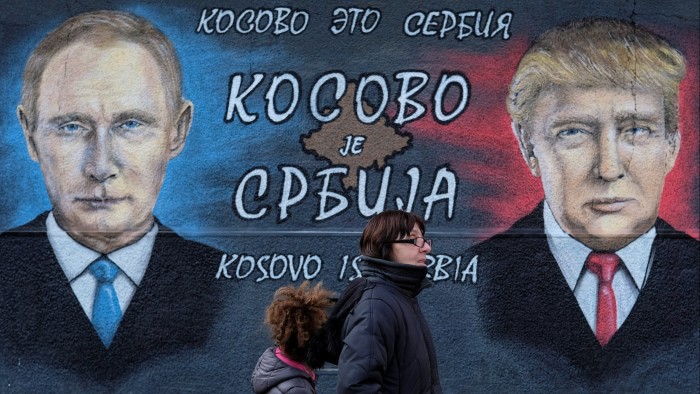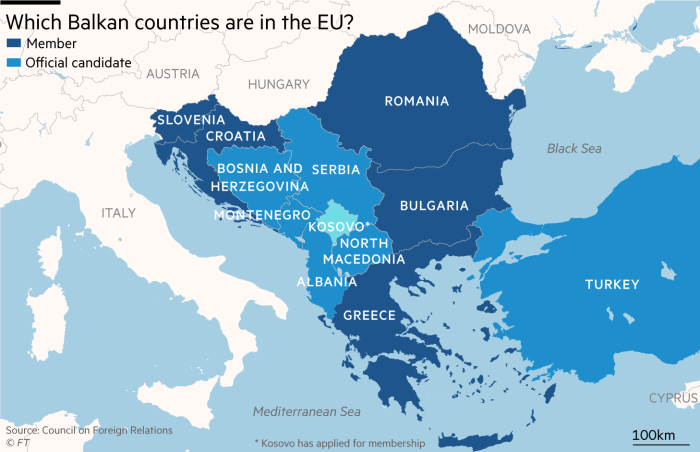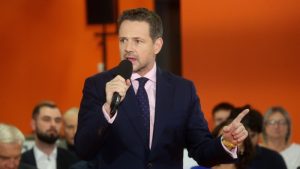Ukraine, the Balkans and the future of EU enlargement

This article is an onsite version of our Europe Express newsletter. Sign up here to get the newsletter sent straight to your inbox every weekday and Saturday morning. Explore all of our newsletters here
Welcome back. According to the official line in Brussels, the EU’s planned enlargement into eastern and south-eastern Europe is making steady progress despite occasional bumps along the road. There is even talk that one of the 10 candidate countries, Montenegro, will join the 27-nation bloc before the end of the 2020s.
Is this view too sanguine? Is the enlargement project in more danger than the EU is letting on in public? I’m at [email protected].
An unresolved tension
There are three main elements to the picture: the impact of world events on the EU; trends in individual EU countries; and developments in the candidate states.
First, a short summary of where things stand.
After stagnating for almost a decade after Croatia’s entry in 2013, enlargement acquired new momentum in 2022 as the EU put together its response to Russia’s full-scale invasion of Ukraine.

To six Balkan countries already waiting in the wings (Albania, Bosnia and Herzegovina, Kosovo, Montenegro, North Macedonia and Serbia), the EU added Georgia, Moldova and Ukraine. Turkey is also a membership candidate, though more on paper than in reality.
However, a certain unresolved tension has always underlain the revived ambitions to expand the EU.
On one hand, EU governments see a powerful geopolitical case for enlarging the bloc. On the other hand, they don’t want to enlarge at any cost: candidate countries are supposed to meet various demanding entry criteria, especially with regard to democracy, the rule of law and the overcoming of historical disputes with existing EU member states.
A related question is whether EU governments are willing or able to undertake the far-reaching reforms to the bloc’s institutions and financial arrangements that are necessary to make a success of enlargement.
Russia and Trump
Events beyond the EU are not necessarily working in favour of enlargement. The two most important are Russia’s advances in its war against Ukraine and Donald Trump’s impending arrival in the White House for a second term.
We cannot predict with certainty the next Trump administration’s policies on the Ukraine war. But Trump and his allies have spoken of wanting a quick halt to the fighting.
Such a step would leave Russia in control of about a fifth of Ukraine’s territory. There would be no reason to expect Moscow to relax its opposition to Ukraine’s entry into western alliance structures – above all Nato but also the EU, whose aspirations for a stronger defence and security profile the Kremlin despises but is nonetheless wary of.
In theory, the EU could proceed with Ukraine’s membership talks, but it would be a risky business if the US and its allies failed to provide the de facto truncated Ukrainian state with solid security guarantees.
We should keep in mind that, under EU rules, each step forward in a candidate country’s progress towards membership requires unanimous approval from the 27 member states. This leaves plenty of room for obstruction from countries that have quarrels with Ukraine.
These include Hungary, with its Russophile sympathies and allegations of mistreatment of Ukraine’s ethnic Hungarian minority; Poland, with its dispute over Ukrainian atrocities against Poles in the second world war; and a range of central and eastern countries with complaints about Ukrainian agricultural exports to the EU.
The US, EU and the Balkans
The difficulties extend beyond Ukraine into the Balkans. In this analysis for the European Council on Foreign Relations, Adnan Ćerimagić and Majda Ruge explain that the first Trump administration played a quirky, even disruptive role in the Balkans, not least by toying with land swaps as a way of settling the dispute between Serbia and Kosovo.
Such an initiative risks destabilising other regions of the Balkans, not least Bosnia and Herzegovina and North Macedonia, by raising doubts over the permanency of current state borders.
In truth, US and European policies towards Serbia have not exactly been helpful for the cause of EU enlargement even during the Biden administration years.
Essentially, the US has taken the view that Serbia’s democratic shortcomings and refusal to join western sanctions on Russia matter less than the fact that President Aleksandar Vučić has quietly offered some support for the west, notably by sending arms to Ukraine.
As for the EU, it has shown more interest in Serbia’s lithium deposits – the largest in Europe, and essential for the electric vehicle industry – than in putting pressure on Belgrade to meet the standards for joining the club.
France and Germany
Next, domestic conditions in EU member states. The chief issues here concern France, Germany and the rising influence of hard-right parties across the bloc.
For a long time, France was sceptical about enlargement, but that changed after 2022 under President Emmanuel Macron. Arthur Leveque, writing for the Estonia-based International Centre for Defence and Security, gives a lucid account of France’s evolving position on enlargement.
The problem now is that Macron’s political strength is draining away under the impact of failed election gambles, a budgetary crisis, a polarised legislature and the possibility of a far-right victory in the 2027 presidential election.
Neither the far right nor the radical left in France is enthusiastic about EU enlargement. That matters, as Charles Grant writes, because under the French constitution a referendum or a three-fifths majority in both houses of parliament is needed to approve the entry of any country into the EU.
In Germany, there is a broader political consensus in favour of enlargement, but not at any price. Theresia Töglhofer explains:
Berlin also considers that accommodating these states requires reform: integrating ill-prepared candidates into an ill-prepared Union is a recipe for trouble.
And at the same time Germany considers that the EU’s “DNA” must be preserved, values such as freedom, democracy, justice. Berlin therefore continues to insist on a merits-based approach – notably when it comes to the rule of law – which is, however, complicated by the geopolitical imperative to speed up the process.
Europe’s hard right
The European hard right’s views on enlargement are far from united, as set out in this illuminating article for Balkan Insight by Alejandro Esteso Pérez.
Some parties are flat out opposed to enlargement because they dislike the EU itself. However, others see enlargement as an opportunity to turn the EU into something closer to an alliance of sovereign nation-states, rather than the loose confederation that aspires to closer union that it is now.
Among the second group is Hungary under Viktor Orbán, who, despite his hostility towards Ukraine, warms to the idea of incorporating countries such as Serbia that he thinks would be useful allies in the EU.
Candidate countries: the case of Montenegro
Finally, conditions in the candidate states. I’ll focus on the case of Montenegro, a country of just 600,000 people that didn’t become independent until 2006, when it broke away from Serbia.
Montenegro rarely receives much attention, but it is of special interest because it seems at first sight to be ahead of the rest of the pack.

In its latest progress report, the European Commission said it was ready to support Montenegro’s ambition to close its accession negotiations by the end of 2026 – which would imply full membership a few years later, if all EU states gave the green light.
Is this realistic?
One reason for caution is that, after a recent reshuffle, Montenegro’s government now depends for support on pro-Serbian and pro-Russian parties that are hostile to the EU and question whether Montenegrins are really a nation or just Serbs by another name. Writing for the China-CEE Institute, Vojin Golubović says:
It is especially dangerous that some of the key ministries are in the hands of those who deny the Montenegrin national identity.
Other signs are ominous, too. Last month, the anti-EU parties proposed a bill on “foreign agents” that is strikingly similar to a Russian-inspired law passed this year in Georgia. That law contributed to the EU’s decision to freeze Georgia’s membership bid.
Moreover, Montenegro angered Croatia in July when its parliament passed a resolution relating to Croatian atrocities in the second world war.
Like the Polish-Ukrainian dispute, and a quarrel over national identity, language and history between Bulgaria and North Macedonia, the clash between Croatia and Montenegro should not be brushed aside as a minor detail.
Until such issues are settled, EU enlargement simply will not happen. And that’s even before we consider the risks surrounding the Ukraine war, Trump’s second term and political developments in the EU itself.
Front-loading financial support to Ukraine: it’s now or never – an analysis by Olga Pindyuk for the Vienna Institute for International Economic Studies
Tony’s picks of the week
-
President-elect Donald Trump’s choice of Robert F Kennedy Jr for the top health job in the US government is a moment for scientists to reflect on how they can nurture constructive relationships with hostile politicians and voters, Anjana Ahuja writes for the FT
-
Kazakhstan’s government has won a tightly controlled referendum to endorse the construction of a nuclear power plant, but is cautious about how or even whether to rely on nuclear energy, Luca Anceschi writes for the Italian Institute for International Political Studies
You can see my choices for the best history books of the year here
Recommended newsletters for you
FT Opinion — Insights and judgments from top commentators. Sign up here
Chris Giles on Central Banks — Vital news and views on what central banks are thinking, inflation, interest rates and money. Sign up here
#Ukraine #Balkans #future #enlargement





